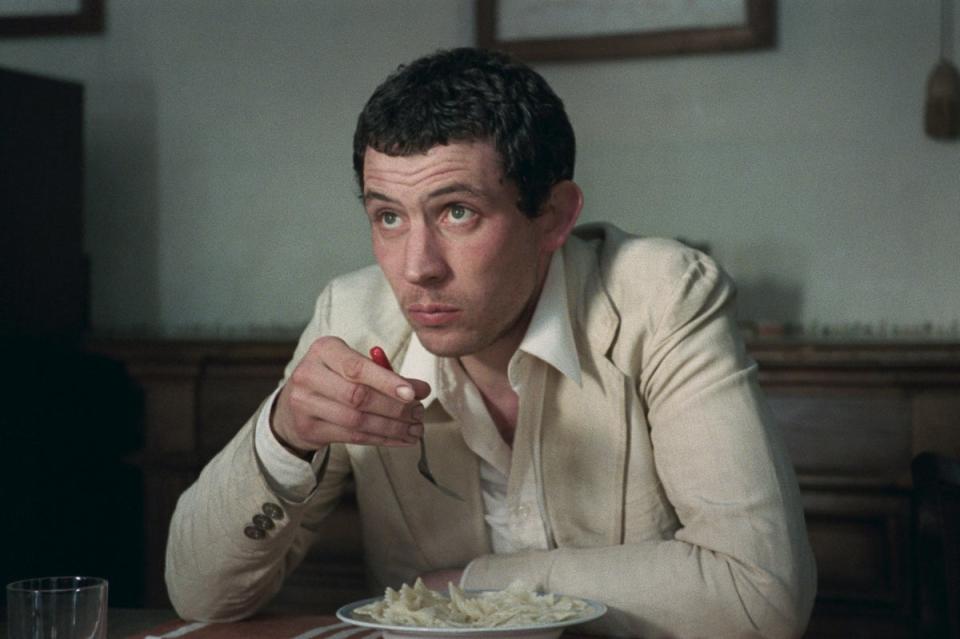La Chimera review: Josh O’Connor embarks on a treasure hunt in this dreamy comedy
What comes out of the ground in La Chimera must be handled with care. It is an Etruscan kylix, a kind of ancient wine cup with a wide, yawning mouth and painted eyes. When held up to the lips, it sees when its drinker cannot, drunkenness having blinded them. It’s a metaphorically potent artefact, uncovered by Arthur (Josh O’Connor), a wayward British archaeologist in Eighties Tuscany, who’s betrayed his profession and fallen in with a band of “tombaroli”, or local graverobbers. They rely on his skill with a “dowsing rod”, a Y-shaped twig that twitches when it’s near to the buried dead, as well as his preternatural visions.
There’s something to this film, and to director Alice Rohrwacher’s work at large, that feels as delicate, as enigmatic, and as spiritually charged as these millennia-old artefacts. It stirs up a fierce protectiveness in the viewer. Treasure this now, hold it, turn it, and examine it from all sides, or it may slip beyond your grasp.
La Chimera, like Happy as Lazzaro and The Wonders before it, is written in the dreamy, subconscious language of collective memory. Cinematographer Hélène Louvart blends aspect ratios and 35mm and 16mm film stocks. The use of round-edged frames and sped-up sequences, made to imitate how silent film was projected, speak to cinema’s own ancient history.
Arthur is haunted by a lost love, Beniamina (Yile Vianello). Is she dead like Eurydice? In that case, Arthur would be Orpheus, who walked deep underground among the dead of Hades to find her and lead her back to life. And yet, when Arthur thinks of her, he sees her with a thread in her hand, a stray part of her knitted dress that’s somehow become buried in the earth. She pulls and pulls at it. Would that not make her Ariadne, the princess whose ball of yarn helped guide Theseus out of the Minotaur’s dark maze and into the light? Who, in La Chimera, is truly lost? And who guides who? The living or the dead? Rohrwacher’s narrative is suggestive, never prescriptive.
O’Connor is the rare famous face in the director’s usual coterie of friends, neighbours, and various non-professionals. But he’s a perfect fit, having taken all the sweaty machismo of Luca Guadagnino’s Challengers and beaten it into weary submission. Arthur doesn’t speak much and, when he does, it’s in lightly mocked Italian. But he does observe. Even at his most defeated, in an unwashed, grubby linen suit (he’s just finished a prison sentence, for archaeological crimes), he looks at the world with sharp and hungry eyes.

Arthur visits Beniamina’s mother, Flora (Isabella Rossellini, ever-luminous). She has taken in a music student, who she really treats as a maid – Italia (Carol Duarte), whose symbolic name introduces the role she’s set to play in Arthur’s life. She’s an authentic free spirit, who challenges the individualist desire to commodify history, and instead finds potential for community in the country’s abandoned and decaying spaces. In a way, she’s a stand-in for Rohrwacher herself, who neatly summarises capitalism in a witty scene in which bickering treasure hunters start snarling at each other like animals. “Does it belong to everyone? Or does it belong to no one?” Italia asks, in reference to the past. Whatever the truth, it lives and breathes in La Chimera.
Dir: Alice Rohrwacher. Starring: Josh O’Connor, Carol Duarte, Vincenzo Nemolato, Alba Rohrwacher, Isabella Rossellini. 15, 133 mins
‘La Chimera’ is in cinemas from 10 May


